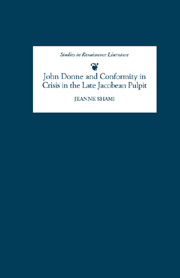Book contents
- Frontmatter
- Contents
- Dedication
- Acknowledgements
- Abbreviations
- 1 “Discreet or religious preachers”: John Donne and the late Jacobean Public Sphere
- 2 “The indiscretion of that foole”: John Knight and the Jacobean Pulpit, 1620–2
- 3 “The fishing of whales”: John Donne's Sermons, 1620–2
- 4 “Faire interpretation”: The Directions and the Crisis of Censorship
- 5 “Wise as Serpents, and innocent as Doves”: Zeal and Discretion in the Pulpit, 1623–5
- 6 “Jesus Wept”: The Journey to Spain and Pulpit Lamentation
- 7 “Blinde buzzards in the choise of a wife”: Sermons and the Moral Marketplace
- 8 “The Lovesick Spouse”: Parliament, Patriots, and the Public Sphere
- 9 “Church-quakes”: Post-Parliamentary Faultlines
- 10 “If the Foundations be Destroyed”: Rules of Engagement
- 11 “Blessed sobriety”: John Donne, the Public Sphere, and Caroline Conformity
- Works Cited
- General Index
- Index to John Donne References
- Index to John Donne's Sermons
- Studies in Renaissance Literature
2 - “The indiscretion of that foole”: John Knight and the Jacobean Pulpit, 1620–2
Published online by Cambridge University Press: 12 September 2012
- Frontmatter
- Contents
- Dedication
- Acknowledgements
- Abbreviations
- 1 “Discreet or religious preachers”: John Donne and the late Jacobean Public Sphere
- 2 “The indiscretion of that foole”: John Knight and the Jacobean Pulpit, 1620–2
- 3 “The fishing of whales”: John Donne's Sermons, 1620–2
- 4 “Faire interpretation”: The Directions and the Crisis of Censorship
- 5 “Wise as Serpents, and innocent as Doves”: Zeal and Discretion in the Pulpit, 1623–5
- 6 “Jesus Wept”: The Journey to Spain and Pulpit Lamentation
- 7 “Blinde buzzards in the choise of a wife”: Sermons and the Moral Marketplace
- 8 “The Lovesick Spouse”: Parliament, Patriots, and the Public Sphere
- 9 “Church-quakes”: Post-Parliamentary Faultlines
- 10 “If the Foundations be Destroyed”: Rules of Engagement
- 11 “Blessed sobriety”: John Donne, the Public Sphere, and Caroline Conformity
- Works Cited
- General Index
- Index to John Donne References
- Index to John Donne's Sermons
- Studies in Renaissance Literature
Summary
CENSORSHIP: TIGHTENING REGULATIONS
ALTHOUGH the conditions for preaching and publishing sermons in the early 1620s did not mark a sharp break with the early part of James's reign, some principles governing allowable pulpit speech can be extrapolated. These principles do not amount to a clearly defined code; however, they suggest that sermons could be examined for both doctrinal and political lapses: exceeding the boundaries of orthodox divinity on the one hand, or meddling with matters of state on the other. Reported cases also suggest that definitions of both kinds of lapse were unstable. Edmond Peacham's case indicates that it was perilous even to possess questionable manuscripts. Peacham's examination and trial for treason engaged some of the best legal minds of the day, demonstrating that regulating words was an important issue for James's administration, even when those words did not enter the public sphere via the pulpit. Peacham never delivered the offending sermon, but in his papers he commented directly upon James, criticizing his prodigality, the misconduct of his officials, and his refusal to subject the ecclesiastical to the temporal courts. The sermon suggested that the king might be smitten with sudden death (after the examples of Ananias and Nabal), or that the people might rise in rebellion. Under examination, Peacham justified his words by authority of his vocation, but James had other ideas.
- Type
- Chapter
- Information
- Publisher: Boydell & BrewerPrint publication year: 2003



